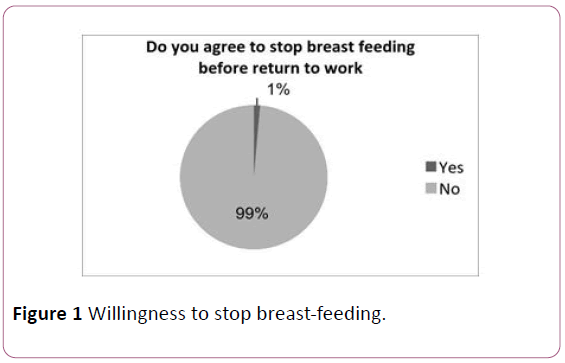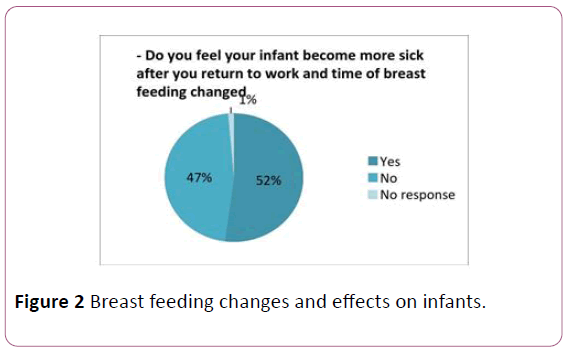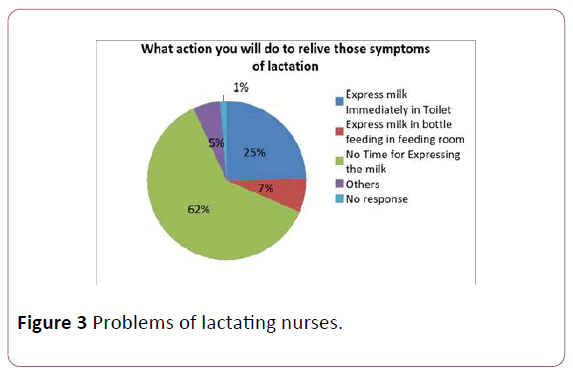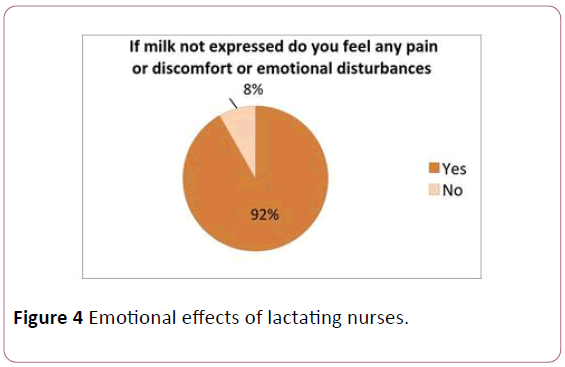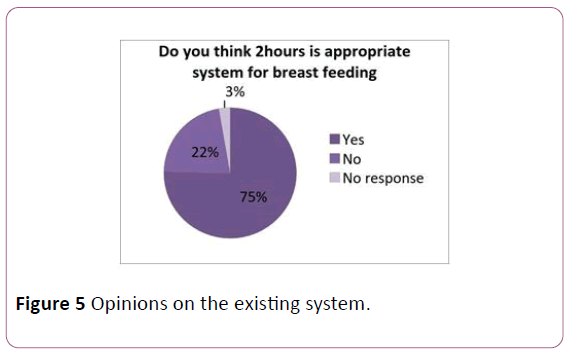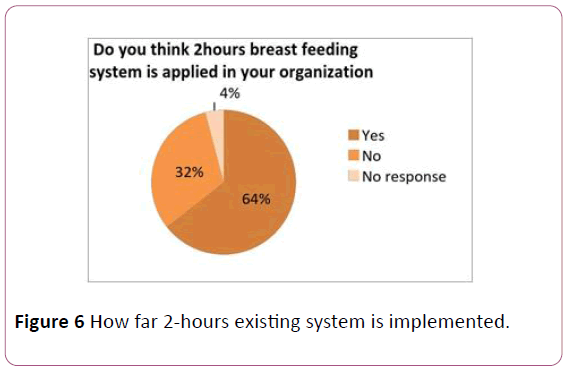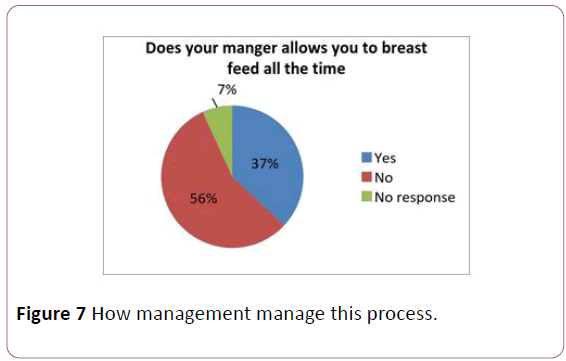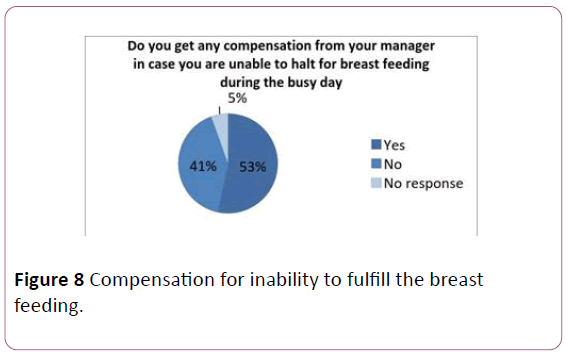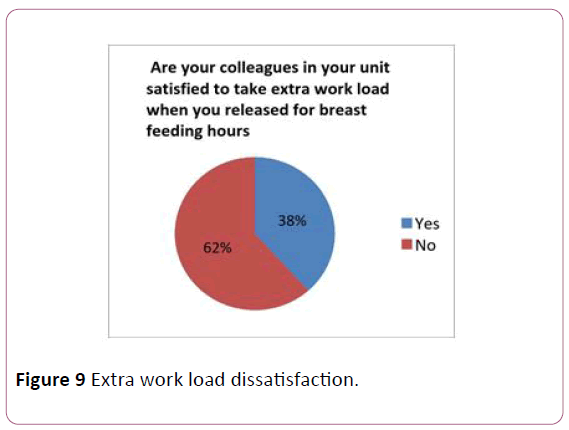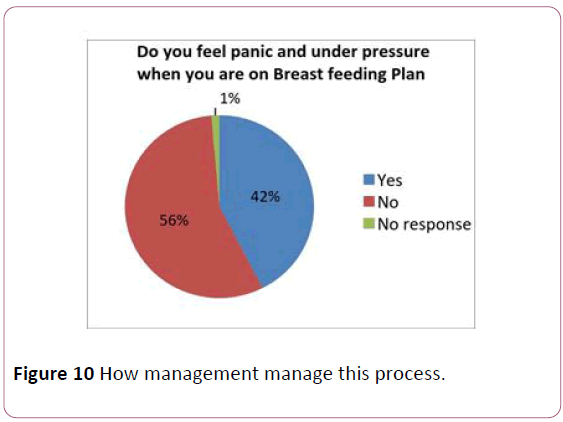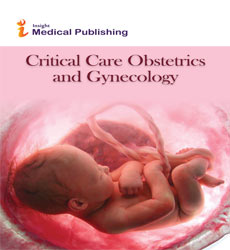The Impact of Time out Hours for Breast Feeding on Work Performance among Nurses in Bahrain
Mahdi MS
DOI10.21767/2471-9803.1000148
Mahdi MS*
Department of Surgery, Kingdom of Bahrain, Bahrain
- Corresponding Author:
- Mahdi MS
Department of Surgery, Kingdom of Bahrain, Bahrain
Tel: + 39739448813
E-mail: mmahdi2@health.gov.bh
Received Date: April 19, 2017; Accepted Date: April 27, 2017; Published Date: April 30, 2017
Citation: Mahdi MS. The Impact of Time out Hours for Breast Feeding on Work Performance among Nurses in Bahrain. Crit Care Obst Gyne. 2017, 3:2. doi:10.21767/2471-9803.1000148
Copyright: © 2017 Mahdi MS. This is an open-access article distributed under the terms of the Creative Commons Attribution License, which permits unrestricted use, distribution, and reproduction in any medium, provided the original author and source are credited.
Abstract
The world health organization and the American Academy of Paediatrics emphasize the importance of breastfeeding for mothers as well as children. Literatures reveal that this right eventually will create a new healthy generation better immune towards diseases. Female nurses in the kingdom of Bahrain, who resume duty on hospitals after two months of maternity leave, face difficulty to continue natural feeding although a two hours breast feeding system is implemented. Caring of patients in the hospital is a very stressful role that requires high level of accuracy, concentration and tolerance to pressure and work load. Therefore, nurses’ mothers face difficulty to balance between work performance and early outing for breastfeeding. Nurses’ mothers intrinsically sense helping others people but are unable to help their own babies. This study aimed to identify difficulties nurses’ mothers’ face in hospital which constraint continuation of breast-feeding practices. Quantitative design was used, and data was collected by using formulated questionnaire with a total sample of 73 nurses’ mothers and 6 nurse supervisors. Interviews were conducted in different acute health care settings in one of the governmental hospitals in Bahrain. Result revealed that the existing system is ineffective in the hospital although it may be effective in other organizations. Set of recommendations were raised. Firstly, to increase the duration of maternity leave up to 6 months. Secondly, to establish a breast feeding Centre, facilitating mothers feeding their babies or storing mothers’ milk in the working areas. Lastly, increase nursing manpower in order to ease the implementation of this system.
Keywords
Time out for two hours; Breast feeding system; Nurse’s mother
Introduction
Breast feeding is important for mothers and babies for a healthy generation. A new system of releasing working mother two hours for breast feeding for two years was applied in the Kingdom of Bahrain by June 2006 but when this system was implemented in the biggest governmental hospital in Bahrain essential evaluation was required [1]. The rate of female are highly seen in nursing field and increasing rate of nurses on breast feeding system will create difficulties. This study will compromise between the nurse mother Rights in breast feeding for two years. Caring of patients in the hospital is a very stressful role that needs high level of accuracy, concentration and tolerance to pressure and work load, in fact, two hours out for breast feeding will impact the work performance especially the quality of patient care. It is important to consider the changes that will take place in order to reach the desired quality [2]. Managing such process in the medical field is not an easy task because the expense is human life (patient life) if not administered very well [3]. The result will help policy makers in making plans and programs and shape recommendations for protection, promotion, in order to get institutional support for breastfeeding mothers in the work force and help them to continue breast feeding.
Objective
To identify the difficulties faced by the nurse’s mothers, colleagues and the nurse supervisor when implementing the two hours breast feeding practices in government hospital.
Methodology
Quantitative design was used, and data was collected by using formulated questionnaire with a total sample of 73 nurses’ mothers and 6 nurse supervisors. Interviews were conducted in different acute health care settings Because of the time constrain and effort limitation, some units were taken as a sample in this study since they are best reflection of the population. The study conducted from August till September 2012.
Total number of nurses in SMC are 1316, 1219 are Females, 97 are Males and from the total numbers there are 236 nurses on breast feeding hours. The selections of the sample study were on critical units such as Accident and Emergency Unit (A&E), Intensive Care Unit (ICU), and Cardiac Care Unit (CCU). Accident and Emergency (A&E) total nurses are 171 (female 153 nurses) (male 18 nurses) (nurses mother on breast feeding hours (BFH) are 29 16.96%). Intensive Care Unit (ICU) Total nurses 120 (nurses mother on BFH 13 10.83%). Coronary cardiac Unit (CCU) Total nurses 77 (nurses mother on BFH is 9 11.68%).
Data Analysis
Almost all lactating nurses refuse to stop breast-feeding before they return back to work as illustrated in figure because they feel that this is the infant rights [4].
The data result shows that lactating mothers insisting the continuation of breast feeding and will not stop breast feeding after returning to the work, even though they are working in sensitive units with critical patients on ventilators who need close monitoring and concentrations (Figure 1).
After returning back from maternity leave, Nurse’s mother should provide a safe place and plan the schedule of timing for breast feeding. Most babies become sick after their mothers leave them for long time due to their duties.
The data shows that (52%) said infant become sick after returning back to work as the time of breast feeding changed. (47%) said infant do not become sick after returning back to work as the time of breast feeding changed [5]. 1% no response.
The result of data shows that majority of nurse’s mother feels their babies become sick after returning to work as the time of breast feeding changed (Figure 2).
Most of nurses are facing breast engorgement as milk accumulation in the breast, severe pain in that area and since they are not feeding their babies on time the milk will wet their uniforms. This cause embarrassment for lactating nurses while they are on duty. Babies need their feeding and mothers are away from them. The mothers need to do some action to relieve those symptoms [6].
• Express milk Immediately in Toilet (25%)
• Express milk in bottle feeding in feeding room (7%)
• No Time for expressing the milk (62%)
• Others (5%)
• No response 1%
It is clear from data that the organization doesn’t provide proper place such as feeding centre for lactating nurses while they are on duty so the milk will be wasted, the baby would suffer from hunger and the mother would complain of breast pain during the work (Figure 3).
The lactating nurse facing difficulties of how to balance between the long and tough duty in the hospital on one hand and breast feeding their babies on the other hand. Because of that, she will developed symptoms such as pain, discomfort and emotional disturbances [7]. Almost all the respondents (92%) positively acknowledge the feeling of pain, discomfort, and emotional disturbances.
The lactating nurses having no symptom of pain or discomfort or emotional disturbances while they are on duty were (8%) which is almost negligible percentage.
The result of data shows that the majority of lactating mothers complain of breast pain, discomfort and emotional disturbances while they are on duty. Those symptoms will have negative consequences on their work performance and may result in incidents due to lack of concentrations, especially since they are health care providers dealing with humans (Figure 4).
The employee is eligible to get 2 hours reduction of the work duty either to come late for 2 hours or leave the duty before 2 hours. The data of the pie chart shown in the figure shows that (75%) of respondents said 2 hours is appropriate system for breast feeding [8]. However (22%) of respondents said two hours is not appropriate system for breast feeding. (3%) of respondents did not respond on this particular question (Figure 5).
The data shows that the system is not equally implemented in all units as the nature of those units caring of critical stage required close monitoring of sick patients. Releasing nurses in those areas for 2 hours will affect patient’s conditions as their health is not stable and suddenly will be deteriorated which need professional nurses to stay with patient all the time [9]. The majority of respondents (64%) responses positively that the 2 hours breast feeding system has been applied. This is an important result which means that no less than 32% having negative perception about the implementation of such system in SMC. The system is there, but the hesitation of implementation is undeniable [10].
The data of the study were not equal but the highest percentage (64%) said yes. (32%) said no, which could be due to the fact that there are a number of nurses on the breast feeding system in certain units who are limited and cannot be released regularly for 2 hours compared to the other high rate of nurses (Figure 6).
The manager play an important role in adjusting releasing nurse’s mother for 2 hours while they are caring for sick patients, they need to balance between the effectiveness and efficiency of work performance in the critical care unit and implementation of nurses mother Rights of breast feeding. Organized release of nurse’s mother for 2 hours should be done according to work situations and human resource availabilities [11].
The data result shown in figure (5-16) indicates that high percentage of nurse’s mother about (56%) was not allowed to breast feed. Once nurse mother released for 2 hours breast feeding no coverage will be available as the work force is very limited in each unit. A quite significantly large percentage (37%) respondent responds positively (yes) to the question which means they implement the system fully (Figure 7).
The nurse mother faces difficulties to leave sick patient without nurse replacement. The breast feeding hours can't be implemented when there are no extra nurses available in the concerned unit. Some managers compensate in case they are unable to halt for breast feeding during the busy day [12].
The data shows that (53%) nurse mother got compensation from the manager in case they are unable to halt for breast feeding during the busy day.
(41%) nurse mothers didn’t get any compensation from the manager in case they were unable to halt for breast feeding during the busy day [13].
(5%) no response from nurse mother in regards to getting compensation from the manager in case they were unable to halt for breast feeding during the busy day. The system is not implemented equally in all units and in all shifts. There is little differences in reading the result which mean the nurses’ mother are not getting their Right of breast feeding (Figure 8).
The nurse's mother faces difficulties to leave sick patient without nurse replacement [14]. Even though it's her right of getting child care hours as the work performance will be negatively affected as the colleagues in that particular unit will look after their patients meanwhile they will take extra work load when breast feed mother released for breast feeding hours.
The data in figure (4-18) shows that (38%) nurse's mothers in the unit are satisfied to take extra work load when their colleagues were released for breast feeding hours.
More importantly (62%) which is the majority of the coworkers in the unit are not satisfied to take extra work load when their partners were released for breast feeding [15-17]. The vast majority of nurses not on breast feeding hours is not satisfied to take additional work especially since their patients’ condition is not stable and need close assessment and observation as mentioned earlier the care ratio in those area 1:1 (Figure 9).
The nurse’s mother should plan their work efficiently since their time is limited and the amount of work required of them is more than the time available that lead nurses to be fast work performers. Moreover, they feel panic and under pressure as they are on a breast feeding plan [18].
The data of figure (4-20) indicates the feeling of nurse’s mother on breast feeding plan. Among them (42%) respondents were responding that they have positive feeling of panic and under pressure when they are on Breast feeding Plan whereas (56%) respondents were responding negatively [19]. This is quite astonishing result but it is attributed to either unclear understanding of the question or they were managing well their time because they cope enough with the stressful work to the extent that there is no psychological effect associated with the inability to leave the work to feed their infants (Figure 10).
Conclusion
The study revealed that the existing system is ineffective in the hospital although it may be effective in other organizations. In this study , the majority of nurses are not getting their Rights of releasing two hours feeding their baby natural milk as they are working in acute health care setting (Table 1). Prolonged duration of breast feeding causes milk accumulation pain, discomfort, panic and emotional disturbances. Therefore, nurses’ mothers face difficulty to balance between work performance and early outing for breast feeding. Nurses’ mothers intrinsically sense helping others people but are unable to help their own babies. On the other hand, Nurse supervisor not permitting nurse mother to take two hours for breast feeding as there are some influences such as Peak time, when it is not possible to release the nurses on breast feeding hours because of the intensive work load and Unsafe time during the night shift.
| Question | A/E | ICU-1 | ICU-2 | PICU | CCU-1 | CCU-2 |
|---|---|---|---|---|---|---|
| 1. Age | 41 years and above | 36-40 years | 36-40 years | 36-40 years | 36-40 years | 31-35 years |
| 2. Years of experience | 11-20 years | 11-20years | 11-20years | 11-20years | 11-20years | 2 years |
| 3. Level of education | Diploma | BSC | BSC | BSC | Master | BSC |
| 4. Position | Nurse Supervisor | Nurse Supervisor | Acting Nurse Supervisor | Team leader | Nurse Supervisor | Acting Nurse Supervisor |
| 5. Number of nurses on breast feeding hours+Total manpower of the unit | 29 S/N Manpower 172 | 29 S/N Manpower 172 | 6 S/N Manpower 26 | 8 S/N Manpower 35 | 5 S/N Manpower 34 | 4 S/N Manpower 33 |
| 6. The difficulties in implementing Breast Feeding Hours system | Yes, Critical care unit with different type of sick Pts. A lot of procedures in A/E can’t be done as nurses are on BFH |
Yes, Critical care unit. sick, ventilator & collapse pts in the unit, the Ratio of care 1:1 | Yes, Critical care unit. Sick, work load on remaining nurses. All pts Connected to ventilator. ratio 1:1 | Yes, Critical baby care unit. sick, work load on remaining nurses as no replacement | Yes, Critical care unit for cardiac illness, especially when big number of nurses on BFH in the same shift | Yes, Critical care unit. sick with cardiac disease, Ratio 2:1 |
| 7. Nurses insist to take breast feeding hours | BFH planned | No | Yes | yes | yes | yes |
| 8. Patient care affected due to the number of nurses on breast feeding hours | yes | yes | yes | yes | Yes | Yes with incidents lead to CPR as pt. ratio of care 2:1 Difficult to adjustduring such situation |
| 9. Methods of compensating feeding hours in case nurses couldn’t off during busy day | Compensating the BFH whenit is possible | Accumulatins of 2 hours BF & get one extra day off per week | Accumulations of 2hours BF & get one extra day off per week when there is chance |
According to situation of the unit can release nurses on BF H system |
No Compensating the BFH if not released | *Team leader available can release feeding nurses *Accumulations of 2hours BF& can get it when there is a chance *Daily nominating BF nurse |
| 10. The difficult shit to release the nurse mothers for breast feeding |
(E/N)shift (E)Increase work load as increase of patient in those shift (N)unsafe time to leave at 4:30am&attend work 12:30Mn |
(M&N) (M) starting working time (N)leaving at 4:30am or attendance at12:30Mn unsafe time |
(N)leaving at 4:30am or attendance at12:30Mn unsafe time & peak hours of work at 4:30am |
All shits as the ratio is 1:1& peak hours of work at the end of shifts |
(M)shift as a lot of procedures in Morning time |
(N)leaving at 4:30 am or attendance at 12:30 Mn unsafe time &peak hours of work at4:30am |
| 11. Received complaints of weakness of work performance from physician as the nurse on breast feeding hours. |
yes | yes | yes | Rarely | Yes, During Doctors round | No |
| 12. How are you going to satisfy the Physician? |
Internal adjustment |
Internal adjustment |
Internal adjustment which add additional responsibilities s on other nurses |
Internal adjustment&the priority for pts. |
Internal adjustment |
|
| 13. Received complaints of weakness of work performance from patients as the nurse on breast feeding hours. |
Yes | Strict visiting hours |
No | No | No | Not clear for relative the absence of BF nurse. |
| 14. How are you going to satisfy the patients |
Internal adjustment |
Proper assignment of BFH |
||||
| 15. Facilities available for nurses lactating mother for breast feeding in your unit |
No | No | No | No | No | No |
| 16. Alternative solution for breast feeding hours for nurses lactating mothers in the organization. |
Mother Rights to get 2hours BF |
Accumulations of 2hours BF& get one extra day off per week for baby care. |
Increase Maternity leave instead of 2months to 6 months till weaning time started |
*Planned one week off based on beds capacity *Ratio1:2when nurse on BFH *Over lab for nurses on BFH *Rotation among ICU units for nurses on BFH to balance the manpower |
Baby feeding centre as long distance to attend for BFH |
*Express the milk in bottle before attending the duty *Not to stop BF for one year as its sensitive for child &mother |
| 17. Suggestions for proper implementation of breast feeding hours system. |
Baby feeding centre |
Increase the maternity leave period that equal to 2hrs/2 years=4months. |
Increase the manpower for replacement as the nurses released for BFH. |
Mother Rights to get 2hours BF& if possible to get one extra day off per week in case of compensation. |
*Baby feeding centre ( she feels as a mother guilty when her dress become wet from milk, believes baby crying wants feeds) |
|
| 18. Recommendations for proper implementation of breast feeding hour’s system. |
Nil | *Increase the manpower to replace when nurse on BFH. |
Baby feeding centre. |
The role should be studied well before implementation as the nature of health worker job dealing with sick pts. different thanother jobs |
*Increase the manpower to replace when nurse on BFH *2hours over time as extending hours(motivation) |
*2hours over time as extending hours(motivation) |
Table 1: Structured interviews with nurse supervisor in critical units. The interviews hold with nurse supervisors, team leader (all bah nationalities) in critical units between 11-23/9/12.
References
- Gartner LM, Morton J, Lawrence RA (2005) Breastfeeding and the Use of Human Milk. Pediatrics 115: 496-506.
- Arifeen S, Black RE, Antelman G, Baqui A, Caulfield L, et al. (2001) Exclusive breastfeeding reduces acute respiratory infection and diarrhea deaths among infants in Dhaka slums. Pediatrics 108: e67.
- Ball TM, Wright AL (1999) Health care costs of formula feeding in the first year of life. Pediatrics 103: 870-876.
- Beral V, Bull D, Doll R, Peto R, Reeves G (2002) Breast cancer and breastfeeding: collaborative reanalysis of individual data from 47 epidemiological studies in 30 countries, including 50,302 women with breast cancer and 96,973 women without the disease. The Lancet 360: 187-195.
- Chien LY, Chu KH, Tai CJ, Lin CY (2005) National prevalence of breastfeeding in Taiwan. Journal of Human Lactation 21: 338-344.
- Cohen R, Mrtek MB, Mrtek RG (1995) Comparison of maternal absenteeism and infant illness rates among breast-feeding and formula-feeding women in two corporations. American Journal of Health Promotion 10: 148-153.
- Friedemann K (2011) The importance of Breastfeeding to the Muslim Child.
- Greer FR, Sicherer SH, Burks AW (2008) Effects of early nutritional interventions on the development of atopic disease in infants and children: the role of maternal dietary restriction, breastfeeding, timing of introduction of comploementary foods, and hydrolyzed formulas. Pediatrics 121: 183-191.
- Ip S, Chung M, Raman G (2007) Breastfeeding and Maternal and infant Health Outcomes in Developed Countries. EvidTechnol Asses 153: 1-186
- Kramer MS, Kakuma R (2001) Optimal duration of exclusive breastfeeding. The Cochrane Library.
- Lovelady CA, Garner KE, Morino KL, Williams JP (2000) The effect of weight loss in overweight lactating women on the growth of their infants. Journal of Medicine 342: 449-453.
- Maternity Protection Convention (2002) Report of the Maternity Protection Convention. Geneva: International Labour Organization.
- Zafar NSH, Gavino M (2008) Breastfeeding and working full time. Retrieved from International Journal of Caring Sciences.
- NCSL (2011) Breastfeeding Laws. Retrieved from National Conference of State Legislatures.
- Niesvviadomy RM (2008) Foundations of Nursing Research.
- Smaooz N (2011) Globally The Role Of Women In Society Today. Retrieved from expertscolumn:
- Lactivist (2006) Interesting Article on Islam and Breastfeeding.
- Walker M (2011) Breastfeeding and Employment: Making It Work.
- World Health Organization (1998) Complementary Feeding of Young Children in Developing Countries: A Review of Current Scientific Knowledge.
Open Access Journals
- Aquaculture & Veterinary Science
- Chemistry & Chemical Sciences
- Clinical Sciences
- Engineering
- General Science
- Genetics & Molecular Biology
- Health Care & Nursing
- Immunology & Microbiology
- Materials Science
- Mathematics & Physics
- Medical Sciences
- Neurology & Psychiatry
- Oncology & Cancer Science
- Pharmaceutical Sciences
